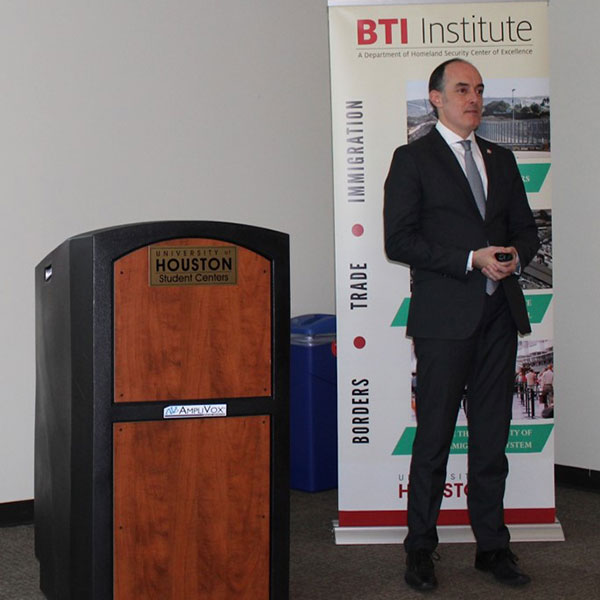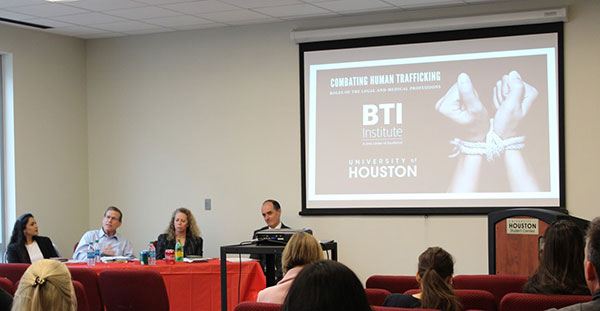
Slavery still exists today in the form of forced labor and forced sexual exploitation collectively referred to as human trafficking. There are an estimated 24.9 million victims in modern slavery according to a 2017 report from the International Labor Organization. Combating human trafficking takes collaboration across industry and profession.
The Borders, Trade, and Immigration Institute hosted a lunch-and-learn focusing on the roles and responsibilities of the legal and medical professions in combating human trafficking at the University of Houston January 31, 2019.
Panelists included Alfonso Lopez de la Osa Escribano, PhD, director of the Center for U.S. and Mexican Law at the University of Houston Law Center; Dr. Juhi Jain, fellow with Emory University Children’s Healthcare Hospital; Edward Gallagher, adjunct professor at UH Law; and Sherri Lynn Zack, human trafficking coordinator for the Southern District of Texas. Biographies are here.
“There is no State that does not have a human trafficking problem,” said Jain. “This affects every single one of us, all of our communities, all of our cities here in the United States.”
Dr. Escribano detailed the current law regulating the medical profession and the challenge of the balance between protecting the health information of their patient and the mandate to report trafficking victims. His presentation can be found here.
Dr. Jain discussed the degree of physical and mental health issues that human trafficking may suffer and the role of the medical profession in identifying red flags that point to human trafficking. Dr. Jain is focusing on creating a trauma-informed multi-disciplinary collaborative healthcare model for survivors. Her presentation can be found here.
Gallagher discussed the evolution of the law from the abolition of slavery to modern day State and Federal criminal law that deals specifically with human trafficking.
“It is a civil rights and organized crime problem,” said Gallagher. To create an effective task force it takes multiple organizations with different views.
Zack discussed the vast amount of underreporting associated with human trafficking.
“The huge problem is victims identifying as victims because they don’t,” said Zack. “Most of the time they do not identify as victims because of the trauma bonds they form with their captors.”
There are still a wide array of issues left to be addressed due to the evolving nature of human trafficking and the prevalence of online recruitment.
The BTI Institute Brown Bag series is a lunch-and-learn series that focuses on the Department of Homeland Security issues. The BTI Institute is a Department of Homeland Security Center of Excellence led by the University of Houston conducting and transitioning research, developing innovative solutions, and providing education that enhances the Nation’s ability to secure the borders, facilitate legitimate trade and travel, and ensure the integrity of the immigration system.
There are a number of resources available for more information about human trafficking. This is not an exhaustive list and does not imply endorsement.
https://www.dhs.gov/blue-campaign
https://www.ilo.org/global/topics/forced-labour/lang--en/index.htm
https://www.globalslaveryindex.org/2018/findings/country-studies/united-states/
https://www.humanrightsfirst.org/resource/human-trafficking-numbers
https://polarisproject.org/initiatives/global-safety-net

Dr. Juhi Jain (left), Edward Gallagher, Sherri Zack, and Dr. Alfonso Lopez de la Osa Escribano discuss the roles of the legal and medical professions in combating human trafficking during a lunch-and-learn hosted by the Borders, Trade, and Immigration Institute at the University of Houston January 31, 2019.